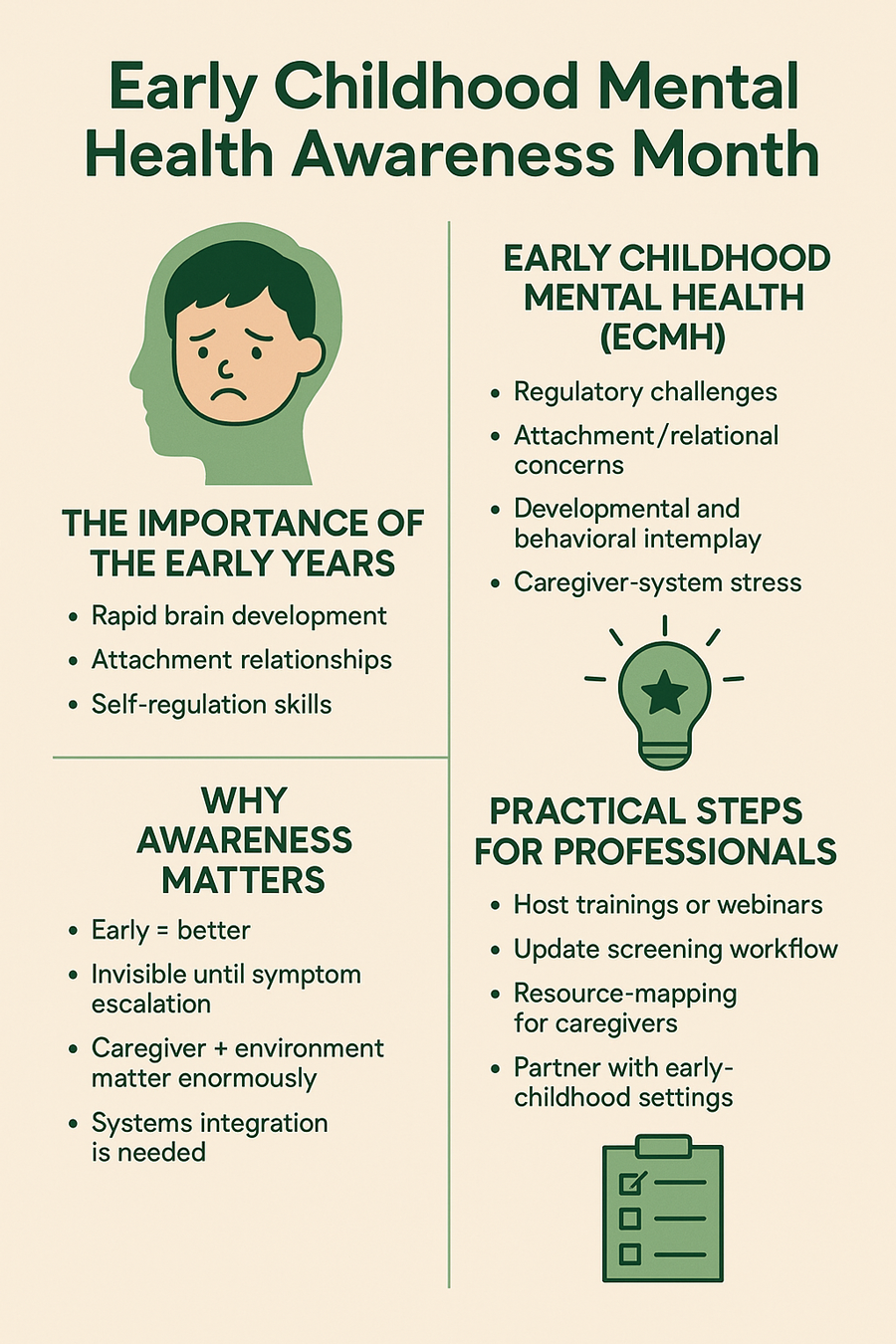Honoring Early Childhood Mental Health Awareness Month: Why Early Years Matter
November 16th, 2025

The significance of the early years
The early childhood period is marked by rapid brain development, evolving attachment relationships, and the onset of self-regulation skills. Neuroscience and developmental-psychology research show that repeated experiences of stress, trauma, or inconsistent caregiving during this sensitive window can dysregulate physiological stress systems (for example, the HPA axis, autonomic nervous system), and undermine emotion regulation, executive functioning, and relational capacities. Meanwhile, positive, stable relationships, responsive caregiving, and safe environments provide protective buffers.
For mental health professionals, this means that early identification of distress, supporting caregivers, and fostering environments of safety and attunement are not optional extras—they are foundational to promoting lifelong resilience.
What Early Childhood Mental Health (ECMH) looks like in practice
Early childhood mental health is more than simply absence of diagnosable disorders. Some key clinical foci:
-
Regulatory challenges: frequent tantrums, difficulty sleeping or feeding, intense reactions to transitions, poor self-soothing in toddlers.
-
Attachment/relational concerns: caregiver-child dyads that show persistent misattunement, avoidant or disorganized interaction patterns, caregiver mental-health or substance-use concerns that undermine the relational field.
-
Developmental and behavioral interplay: children whose emotional regulation difficulties lead to delays in play, language, peer interaction, or who exhibit irritability, aggression or withdrawal.
-
Caregiver-system stress: high caregiver stress, mental-health symptoms, poverty, housing instability, or unrelenting adversity that impact the caregiving environment.
As professionals we can adopt a strengths‐based, relationship‐focused lens: What resources exist in the child’s ecosystem (family, community, culture)? What developmental stage is the child at? How can we partner with caregivers to enhance protective relational scaffolds?
Why awareness matters—and what to spotlight this month
This awareness month provides a valuable opportunity to amplify several key messages:
-
Early = better: The earlier intervention occurs, the more plastic the developmental system and the greater the opportunity for corrective experiences. Delays in recognition and referral often mean mounting relational trauma, entrenched dysregulation, and more costly treatment later.
-
Invisible until symptom escalation: In many settings, emotional/behavioral dysregulation in preschoolers is seen as “bad behavior” or “just a phase.” Many systems (child-care, pediatric clinics, early learning) lack mental-health screening, and caregivers may not understand that “big feelings, frequent meltdowns” might signal early mental-health risk.
-
Caregiver + environment matter enormously: It’s not just the child. Supporting the adult caregivers—via psychoeducation, parental emotion-regulation coaching, linking to stress-reduction resources—equally matters. Interventions that build caregiver capacity to respond warmly and reliably yield better child outcomes.
-
Systems integration is needed: Effective ECMH services rarely sit solely in mental-health clinics. They involve early childhood programs, pediatric primary care, early intervention/IFSP systems, home-visiting programs, child-care settings, and family supports. Awareness month is a chance to engage cross-system collaboration.
-
Cultural & equity lenses matter: Many children from historically marginalized groups face cumulative adversity and lack access to early mental-health services. ECMH awareness must include culturally responsive practice, anti-bias frameworks, and system-level advocacy for access and equity.
Practical steps for mental-health professionals this month
-
Host an “early years” in-service or webinar for pediatricians, early-childhood educators, child-care partners or home-visiting staff on recognizing regulatory/relational red-flags, and making warm hand-offs to ECMH providers.
-
Update your screening workflow: Consider integrating age-appropriate screening tools (for children under 5) into intake or referral processes—such as the Ages & Stages Social-Emotional (ASQ:SE), the Devereux Early Childhood Assessment (DECA), or observational checklists of caregiver-child interaction quality.
-
Resource-mapping for caregivers: Prepare a one-page “resource map” for families with young children listing free/low-cost local options (programs for early-childhood mental health, home visiting, family support, play-therapy groups, trauma-informed child-care, etc.).
-
Partner with early-childhood settings: Reach out to ECCE (early childhood care & education) providers or early intervention services in your area and offer consultation, supervision, or on-site support (for example, reflective supervision for staff, child-care provider training in relational regulation).
-
Use social media or your practice newsletter: This month, publish a short article or infographic for caregivers: “Why Your Child’s Big Feelings Matter,” “How to Build Your Child’s FIRST 5 Years of Emotional Health,” or “When to Worry: Early Regulatory red flags.” Empower caregivers with knowledge.
-
Reflect on your lens: Take time this month to audit your own practice for accessibility (Are you welcoming to caregivers of very young children? Do you provide flexible sessions, include caregivers in treatment planning, attend to play-based or dyadic modalities?). Consider also your cultural humility: Are the early-childhood families you serve reflective of diverse backgrounds? Are you attuned to systemic barriers?
Looking ahead
As we honor Early Childhood Mental Health Awareness Month, let’s commit as mental-health professionals to elevating early relational and regulatory health as core to our mission—not just prevention, but promotion of thriving in those first years. When we collaborate with caregivers, partner with early-childhood settings, and embed relational-regulation frameworks into our work, we build a stronger foundation for children’s futures.
Remember: When a toddler’s meltdown is met with calm, relational attunement rather than frustration; when a caregiver is supported rather than judged; when systems meet children and families where they are—then early childhood mental health becomes not only possible but probable.
Note: This blog is intended for informational purposes only and does not substitute individualized clinical judgment or treatment planning. If you are working with a child or family experiencing concerns, please refer to appropriate specialists and follow your local licensing guidelines.